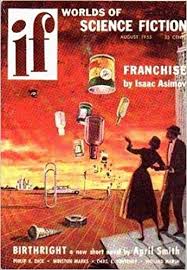The Patriot Page #4
Earth was through with war. And while it is right that man have peace, it is also right that he have freedom. But Mars was in slavery, and to Mars Cornel Lorensse dedicated his life and his talent....
"I may add that I have studied the law carefully, and I can assure you that this composition is not military in nature. "Ladies and gentlemen of Earth, accompanied by the orchestra I shall now play The Martianne." In the control rooms of the auditorium and of relay points throughout the world, censors, vaguely alarmed by Cornel's words, hovered with their fingers on cutoff keys. Then they relaxed. Cornel had told the truth. There was nothing of a military nature in the opening bars of The Martianne. It was a theme handled, but less competently, in some of his other compositions. The woodwinds began on a soft, sad note, gradually rising in power, like the thin winds that moaned across the Martian desert sands. Into this, almost inaudibly at first, crept the clear piano notes that marked the cautious, wondering intrusion of humanity on an alien world. The drums beat the construction of the domes, the horns blared the landing of the spaceships, the violins cried the hopes of the men and women who went to Mars to find a new life. It was a picture in music, so skilfully drawn that when the first discordance crept in, every listener could identify it instantly as the age-old greed of man seeking to subvert frontier freedoms to his own selfish ends. When the blare of trumpets and the ruffle of drums thundered into the final militant theme of The Martianne, every listener knew it bespoke the valiant fight of men for freedom against an oppressor. Every listener knew what he heard was music that had been prohibited on Earth for a decade—yet they listened. The censors, shocked, galvanized, started to act, to cut off the broadcast—and could not. The powerful music had crept insidiously into their minds, and their fingers were paralyzed above the keys while The Martianne flamed triumphant through the air of Earth. When the final note had died away, Cornel stood up at his piano and said into the microphones: "That is the music of Mars. Remember it, people of Earth." It was a brief trial. Cornel was admittedly guilty of violating the law against inciting the public to military action, but because of Meta's influence and the temper of the people, he was not sentenced to prison. He was deported to Mars, freed to return to his own people. Spurred by the Mars Corporation, the Earth government acted quickly. The Martianne was the most dangerous of any music the psychosociologists had banned. Its performance was prohibited on pain of death, possession of a tape of it was punishable by fine and imprisonment. But too many tapes had been home-recorded on the night of Cornel's last concert. Too many people remembered the basic strains, the theme of The Martianne. Laws could not confine it. It was hummed, at first secretly, then openly and defiantly. And too many people had hung on every televised instant of Cornel's trial and had heard him say, simply and earnestly, why he had violated the laws designed to protect the peace of Earth, why he had willingly endangered his life. "It is right that men should have peace," said Cornel on the witness stand, "but first, it is right that they should have freedom." At first secretly, then openly and defiantly, the Friends of Mars grew into an organization that poured the contributions of the people of Earth into ships and guns for the free people of Mars. Every Martian year they play it formally now, on the anniversary of the signing of the Mars Charter. In solemn ceremonies, the military band of Mars plays The Martianne before the imposing edifice erected at Charax by Meta Erosine in memory of Cornel Lorensse, the patriot who died in action during the final siege of Mars City.
Translation
Translate and read this book in other languages:
Select another language:
- - Select -
- 简体中文 (Chinese - Simplified)
- 繁體中文 (Chinese - Traditional)
- Español (Spanish)
- Esperanto (Esperanto)
- 日本語 (Japanese)
- Português (Portuguese)
- Deutsch (German)
- العربية (Arabic)
- Français (French)
- Русский (Russian)
- ಕನ್ನಡ (Kannada)
- 한국어 (Korean)
- עברית (Hebrew)
- Gaeilge (Irish)
- Українська (Ukrainian)
- اردو (Urdu)
- Magyar (Hungarian)
- मानक हिन्दी (Hindi)
- Indonesia (Indonesian)
- Italiano (Italian)
- தமிழ் (Tamil)
- Türkçe (Turkish)
- తెలుగు (Telugu)
- ภาษาไทย (Thai)
- Tiếng Việt (Vietnamese)
- Čeština (Czech)
- Polski (Polish)
- Bahasa Indonesia (Indonesian)
- Românește (Romanian)
- Nederlands (Dutch)
- Ελληνικά (Greek)
- Latinum (Latin)
- Svenska (Swedish)
- Dansk (Danish)
- Suomi (Finnish)
- فارسی (Persian)
- ייִדיש (Yiddish)
- հայերեն (Armenian)
- Norsk (Norwegian)
- English (English)
Citation
Use the citation below to add this book to your bibliography:
Style:MLAChicagoAPA
"The Patriot Books." Literature.com. STANDS4 LLC, 2025. Web. 22 Jan. 2025. <https://www.literature.com/book/the_patriot_77>.




Discuss this The Patriot book with the community:
Report Comment
We're doing our best to make sure our content is useful, accurate and safe.
If by any chance you spot an inappropriate comment while navigating through our website please use this form to let us know, and we'll take care of it shortly.
Attachment
You need to be logged in to favorite.
Log In